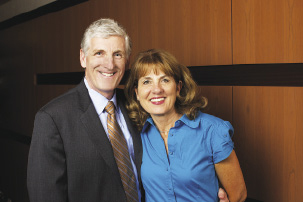When Kathy and Brian MacLean, both FCRH ’75, decided to give back to Fordham, they had two stipulations: that their philanthropy support something tangible and that it take effect immediately.

Photo by Jon Roemer
To that end, the MacLeans have established the Fordham Housing Fund, an initiative that will cover room and board for deserving commuter students who would most benefit from living on campus during their junior and senior years.
“The University gives scholarships for academics, but no scholarships for housing,” said Kathy MacLean.
“The fund will provide housing for undergraduates who have great financial need, so that they can live on campus and be free from making commutes that run two hours or even longer,” she said.
Brian, an English major, and Kathy, who double-majored in American studies and communications, support the University where they not only found an education, but also found each other during their freshman year.
Their $500,000 gift will be split into two parts: $350,000 for an endowment to support the housing fund and $150,000 for Fordham College at Rose Hill and the Fordham Founder’s Award.
The housing fund is the second gift that the MacLeans have made to support students at Fordham. Four years ago, they established the Brian and Kathleen MacLean Scholarship Fund with a $250,000 gift to benefit upperclassmen with financial need.
The Collegiate Science and Technology Entry Program (CSTEP) at Fordham, which helps to prepare minority and economically disadvantaged students for college life, will assist in identifying the housing recipient. The MacLeans’ vision is that moving to campus will transform that student’s University experience by relieving him or her of a long commute or a stressful home life.
The MacLeans deliberately chose not to create a named fund because they want to inspire others to join them in making the housing fund a major Fordham initiative. A Fordham College at Rose Hill alumnus from the Class of 1967 has already pledged $100,000 to the effort.

Photo courtesy of Brian and Kathy MacLean
Brian MacLean hopes the recipient is evaluated on more than just his or her grades. “I’m not saying that GPA is irrelevant, but it’s important to consider all the factors and ask, ‘How can this gift make the most difference, and for whom does it make the most sense?’” he said.
“I can think of a zillion reasons why a person with a 3.8 GPA might get it. But a person with a 3.2 GPA might be taking harder courses, or might come from a more challenging environment.”
Assessing talent is something with which Brian is well practiced. He is president and chief operating officer at Travelers, a leading provider of property casualty insurance products that generated $25 billion in revenues in 2010.
He recently accepted the position of chairman of the President’s Council at Fordham, a select group of alumni who support the University at leadership levels and seek engagement beyond philanthropy.
“Hopefully, the President’s Council can offer the University a perspective from the outside world about what the business community looks for in students and how Fordham can help them to be successful,” he said.
“I think we’re a good sounding board for the University.”
Through his involvement in the President’s Council, Brian made several visits to campus to speak to students, which led him to teach “The Ground Floor,” an introductory business class for freshmen.
An adjunct professor in the Gabelli School of Business, MacLean is also a true believer in a liberal arts education. “Fordham exposed me to a lot of different ideas and varied experiences. At its best, a liberal arts education teaches you how to think,” he said.
Kathy serves on the Parents’ Leadership Council. Tommy, the youngest of their six children, is a senior at Fordham.
The MacLeans were first-generation college students who, like many of their contemporaries, funded their educations through scholarships, loans and working. They realize, however, that current students face a much greater challenge.
“It took us 10 years to pay our loans, and between us we owed about $100 per month—a lot of money for us at the time. That pales in comparison to the crushing debt recent graduates carry,” Kathy said.
“We jumped into our post-Fordham lives with little concern for how we would proceed, but with every expectation that we could make it work,” she continued. “I don’t know if today’s students have the freedom to think so positively. When I consider their loan amounts, it boggles my mind.
“We’re happy to help students embrace their futures knowing they have fewer financial constraints,” she said.
